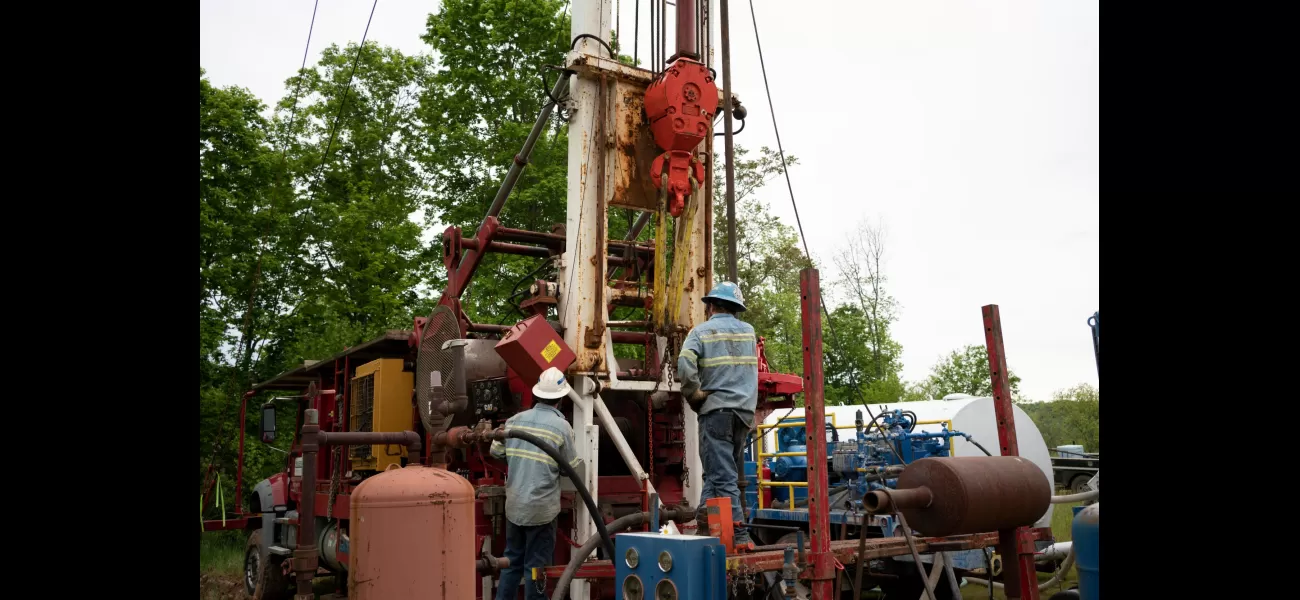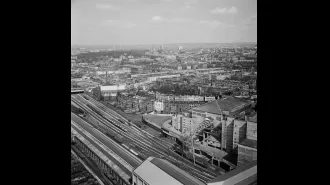JD Vance made a career out of portraying himself as an expert on 'Hillbilly' Appalachia, but residents say he doesn't truly understand it.
How do actual Appalachians feel about Vance's portrayal of their region and experiences?
July 20th 2024.

According to experts in academia, Vance has every right to share his personal story, but they caution against using it as a representation of the entire region. In his book, "Hillbilly Elegy," Vance, who was once Donald Trump's running mate, opens up about his upbringing as a Scots-Irish hillbilly, stating, "To understand me, you must understand that I am a Scots-Irish hillbilly at heart." The memoir became a bestseller, selling over a million copies, and even landed him a deal with Netflix for a movie adaptation. Some even credit the book for launching his political career.
During the 2016 presidential election, when Americans were trying to make sense of Trump's victory, Vance's book seemed to provide an explanation. It shed light on the struggles of Appalachia, a region that Vance holds close to his heart but feels is often overlooked and neglected. Trump's promise to revitalize industries in the area was a lifeline for the struggling community. However, despite appearing to have a deep connection with the region, Vance actually never lived there. He was born and raised in rural Ohio, in the Rust Belt, after his grandparents moved there from Jackson, Kentucky.
Nevertheless, Vance still considers the Appalachian "holler" in Kentucky as his home, and he writes about the region's trials and tribulations in his nearly 250-page memoir. He says, "I identify with the millions of working-class white Americans of Scots-Irish descent who have no college degree. Americans call them hillbillies, rednecks, or white trash. I call them neighbors, friends, and family." But what do the actual people of Appalachia think about Vance's portrayal of their homeland and their lives?
Vance's public image is largely based on his book, "Hillbilly Elegy." The Appalachian region, named after the mountain range that runs through it, spans across 13 US states, from New York to Mississippi. According to Dr. Anthony Harkins, a History professor at Western Kentucky University and co-author of "Appalachian Reckoning: A Region Responds to Hillbilly Elegy," it is a vast area with different subregions, including northern and southern Appalachia. The region has been heavily reliant on extractive industries since the late 19th and 20th centuries, but these industries have been in decline for most of its history.
One of these industries was coal mining, which once provided well-paying jobs in rural Appalachia. However, it has also caused damage to the local environment, and when the coal ran out, so did the jobs and the money. As a result, many towns in Appalachia have been left abandoned, with empty buildings and a lack of employment opportunities. Unfortunately, for most Americans, Appalachia is often "out of sight, out of mind."
To put it in perspective, Dr. Harkins compares Appalachia to rural Wales or northern Scotland for the UK. It has a rich tradition and musical culture, but it is often viewed as being resistant to change and stuck in its ways. In her essay, "Hillbillies Need No Elegy," Meredith McCarroll, the director of writing and rhetoric at Bowdoin College, writes, "Every now and then, America remembers Appalachia exists. One such moment was after the 2016 presidential election, when the rural working class's support for a wealthy New York businessman left many Americans stunned."
After Vance's book was published, another book, "Appalachian Reckoning," was released, co-authored by McCarroll and Harkins. It featured personal essays from real Appalachians, who were born and raised in the region, in response to "Hillbilly Elegy." McCarroll explains, "Vance spent time with his grandparents in Eastern Kentucky and has legitimate ties to that place." However, many feel that his portrayal of the region is one-sided and does not accurately represent the diverse and complex reality of Appalachia. Southern Appalachia overwhelmingly voted for Trump in both the 2016 and 2020 elections, but this does not mean that all Appalachians share the same political views or experiences.
In conclusion, while Vance has every right to share his personal story, it is essential to recognize that it is just one perspective and does not speak for the entire region. Appalachia is a vast, diverse, and proud region, with a rich culture and history that cannot be reduced to a single narrative.
Vance's story may be his own, but experts say he should not be seen as the sole representative of the Appalachian region. According to academics, it is important to understand the context of Vance's experiences before accepting him as a figurehead for the area.
In his bestselling book, "Hillbilly Elegy," Vance, who was Donald Trump's vice presidential running mate, introduces himself as a Scots-Irish hillbilly at heart. The book, which has sold over a million copies and has been adapted into a Netflix movie, has been credited with launching Vance's political career.
During the 2016 US presidential election, as the nation wondered why so many people had voted for Trump, Vance's book seemed to offer an explanation. He argued that the overlooked and struggling region of Appalachia had played a significant role in Trump's victory. When Trump promised to bring back industry to the area, it was seen as a lifeline for the struggling community.
However, it is worth noting that Vance did not actually live in Appalachia. He was born and raised in rural Ohio, in the Rust Belt, after his grandparents moved there from Jackson, Kentucky. Despite this, Vance claims to consider the Kentucky holler, a term used to describe a small, remote valley in Appalachia, as his home. He wrote at length about the region's challenges in his nearly 250-page memoir, saying, "I identify with the millions of working-class white Americans of Scots-Irish descent who have no college degree. Americans call them hillbillies, rednecks, or white trash. I call them neighbors, friends, and family."
But what do the actual people of Appalachia think about Vance's portrayal of their homeland and way of life? Dr. Anthony Harkins, a history professor at Western Kentucky University and co-author of "Appalachian Reckoning: A Region Responds to Hillbilly Elegy," explains that the region is much larger and more diverse than what is portrayed in Vance's book. It spans across 13 US states, from New York to Mississippi, and has different sub-regions, including northern and southern Appalachia. The region has been largely defined by extractive industries, such as coal mining, which have been in decline for decades, leading to a lack of stable job opportunities.
McCarroll, who co-authored "Appalachian Reckoning," compares Appalachia to rural areas in the UK, such as Wales or northern Scotland, with proud traditions and cultural heritage, but often overlooked and left behind by mainstream society. She argues that the 2016 election was a wake-up call for America, as people were surprised by the overwhelming support for Trump in southern Appalachia.
In response to Vance's book, McCarroll and Harkins released "Appalachian Reckoning," a collection of personal essays from real Appalachians, offering a different perspective on the region. McCarroll explains that Vance's ties to the area are legitimate, as he spent time with his grandparents in Eastern Kentucky, but he should not be seen as the sole representative of Appalachia.
In conclusion, Vance's story may have resonated with many Americans, but it is important to recognize that it is only one perspective among many in the diverse and complex region of Appalachia. It would be a mistake to view him as a figurehead for the area without considering the experiences and voices of the people who actually call it home.
During the 2016 presidential election, when Americans were trying to make sense of Trump's victory, Vance's book seemed to provide an explanation. It shed light on the struggles of Appalachia, a region that Vance holds close to his heart but feels is often overlooked and neglected. Trump's promise to revitalize industries in the area was a lifeline for the struggling community. However, despite appearing to have a deep connection with the region, Vance actually never lived there. He was born and raised in rural Ohio, in the Rust Belt, after his grandparents moved there from Jackson, Kentucky.
Nevertheless, Vance still considers the Appalachian "holler" in Kentucky as his home, and he writes about the region's trials and tribulations in his nearly 250-page memoir. He says, "I identify with the millions of working-class white Americans of Scots-Irish descent who have no college degree. Americans call them hillbillies, rednecks, or white trash. I call them neighbors, friends, and family." But what do the actual people of Appalachia think about Vance's portrayal of their homeland and their lives?
Vance's public image is largely based on his book, "Hillbilly Elegy." The Appalachian region, named after the mountain range that runs through it, spans across 13 US states, from New York to Mississippi. According to Dr. Anthony Harkins, a History professor at Western Kentucky University and co-author of "Appalachian Reckoning: A Region Responds to Hillbilly Elegy," it is a vast area with different subregions, including northern and southern Appalachia. The region has been heavily reliant on extractive industries since the late 19th and 20th centuries, but these industries have been in decline for most of its history.
One of these industries was coal mining, which once provided well-paying jobs in rural Appalachia. However, it has also caused damage to the local environment, and when the coal ran out, so did the jobs and the money. As a result, many towns in Appalachia have been left abandoned, with empty buildings and a lack of employment opportunities. Unfortunately, for most Americans, Appalachia is often "out of sight, out of mind."
To put it in perspective, Dr. Harkins compares Appalachia to rural Wales or northern Scotland for the UK. It has a rich tradition and musical culture, but it is often viewed as being resistant to change and stuck in its ways. In her essay, "Hillbillies Need No Elegy," Meredith McCarroll, the director of writing and rhetoric at Bowdoin College, writes, "Every now and then, America remembers Appalachia exists. One such moment was after the 2016 presidential election, when the rural working class's support for a wealthy New York businessman left many Americans stunned."
After Vance's book was published, another book, "Appalachian Reckoning," was released, co-authored by McCarroll and Harkins. It featured personal essays from real Appalachians, who were born and raised in the region, in response to "Hillbilly Elegy." McCarroll explains, "Vance spent time with his grandparents in Eastern Kentucky and has legitimate ties to that place." However, many feel that his portrayal of the region is one-sided and does not accurately represent the diverse and complex reality of Appalachia. Southern Appalachia overwhelmingly voted for Trump in both the 2016 and 2020 elections, but this does not mean that all Appalachians share the same political views or experiences.
In conclusion, while Vance has every right to share his personal story, it is essential to recognize that it is just one perspective and does not speak for the entire region. Appalachia is a vast, diverse, and proud region, with a rich culture and history that cannot be reduced to a single narrative.
Vance's story may be his own, but experts say he should not be seen as the sole representative of the Appalachian region. According to academics, it is important to understand the context of Vance's experiences before accepting him as a figurehead for the area.
In his bestselling book, "Hillbilly Elegy," Vance, who was Donald Trump's vice presidential running mate, introduces himself as a Scots-Irish hillbilly at heart. The book, which has sold over a million copies and has been adapted into a Netflix movie, has been credited with launching Vance's political career.
During the 2016 US presidential election, as the nation wondered why so many people had voted for Trump, Vance's book seemed to offer an explanation. He argued that the overlooked and struggling region of Appalachia had played a significant role in Trump's victory. When Trump promised to bring back industry to the area, it was seen as a lifeline for the struggling community.
However, it is worth noting that Vance did not actually live in Appalachia. He was born and raised in rural Ohio, in the Rust Belt, after his grandparents moved there from Jackson, Kentucky. Despite this, Vance claims to consider the Kentucky holler, a term used to describe a small, remote valley in Appalachia, as his home. He wrote at length about the region's challenges in his nearly 250-page memoir, saying, "I identify with the millions of working-class white Americans of Scots-Irish descent who have no college degree. Americans call them hillbillies, rednecks, or white trash. I call them neighbors, friends, and family."
But what do the actual people of Appalachia think about Vance's portrayal of their homeland and way of life? Dr. Anthony Harkins, a history professor at Western Kentucky University and co-author of "Appalachian Reckoning: A Region Responds to Hillbilly Elegy," explains that the region is much larger and more diverse than what is portrayed in Vance's book. It spans across 13 US states, from New York to Mississippi, and has different sub-regions, including northern and southern Appalachia. The region has been largely defined by extractive industries, such as coal mining, which have been in decline for decades, leading to a lack of stable job opportunities.
McCarroll, who co-authored "Appalachian Reckoning," compares Appalachia to rural areas in the UK, such as Wales or northern Scotland, with proud traditions and cultural heritage, but often overlooked and left behind by mainstream society. She argues that the 2016 election was a wake-up call for America, as people were surprised by the overwhelming support for Trump in southern Appalachia.
In response to Vance's book, McCarroll and Harkins released "Appalachian Reckoning," a collection of personal essays from real Appalachians, offering a different perspective on the region. McCarroll explains that Vance's ties to the area are legitimate, as he spent time with his grandparents in Eastern Kentucky, but he should not be seen as the sole representative of Appalachia.
In conclusion, Vance's story may have resonated with many Americans, but it is important to recognize that it is only one perspective among many in the diverse and complex region of Appalachia. It would be a mistake to view him as a figurehead for the area without considering the experiences and voices of the people who actually call it home.
[This article has been trending online recently and has been generated with AI. Your feed is customized.]
[Generative AI is experimental.]
0
0
Submit Comment





